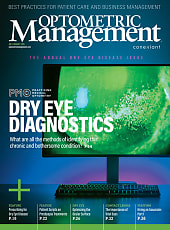BUSINESS
business strategies
A “Hire” Purpose
If you want a rock star staff, you need a “curriculum”
GARY GERBER, O.D.

Before your first day of optometry school, there was a plan in place to ensure that you learned all you needed and that you received the requisite number of hours and patient encounters. That didn’t happen by chance. No one walked in to his or her first lecture and heard, “So, what do you guys want to talk about today?”
If you’re a practice owner, you know that an amazing staff is what makes for an amazing practice — more than a great social media presence, impressive optical displays and inventory, or the absolute best technology.
If you take your hiring process as seriously as your school took your education and spend time planning how you’ll hire your next employee, you’ll get better results. Hiring purposefully with a game plan will get you a better hire than hiring with no strategy under the stress of replacing an employee who leaves unexpectedly or is fired.
Write it
The first step, which, while obvious, is rarely done: write exactly what you want before you hire someone. This is like a job description. In our experience, the few doctors who have these documents reserve them for after someone is hired. Use this as your template to advertise the opening and as a guideline to hiring.
Within this document, include both the requisite day-to-day skills (e.g., sell glasses) and macro level skills. It might be nice to have someone with optical sales experience, but experience in selling something else should matter and should put a candidate ahead of someone without sales experience.
If this person will interact with patients, as most employees do, then he or she will represent your brand. So, this document should include the emotions you want your patients to experience after meeting or dealing with this person. See if you and your staff feel the same about the candidate after interacting with him or her during the interview. Also, check references. Enough said here, yet so few do it!
Test for skills
Prove applicants have the skills they say they do. References can help; but so can tests.
For example, if you’re hiring an optician for your lab, have him or her edge glasses and work with some frames in front of you.
If you require computer skills, have the candidate do some computer work while you watch.
When a candidate gets this far, consider background checks, such as a criminal background check, credit check and drug test. These inexpensive, legal and easy-to-carry-out tests can save you a lot of grief down the line.
You often hear, “This is the most important interview question to ask an applicant,” yet the odds of a single magical question ferreting out poor candidates and leaving you with only great ones is essentially zero. There are no such questions; if you do all of the above, there don’t need to be.
It’s a process
Look at hiring not as an event happening during the job interview, but as a process that happens through time. If you have a hiring process and strategy in place, you should never feel the interview is the specific time to hire. OM
DR. GERBER IS THE PRESIDENT OF THE POWER PRACTICE, A COMPANY SPECIALIZING IN MAKING OPTOMETRISTS MORE PROFITABLE. LEARN MORE AT WWW.POWERPRACTICE.COM, OR CALL DR. GERBER AT (888) 356-4447.



